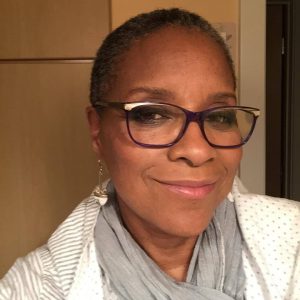Over the next few weeks, we’ll be introducing you to some of the world-changing storytellers that will be speaking at Story Movements, our new catalytic two-day convening September 15-16 that examines platforms and genres of civic media storytelling through the lens of social justice. From documentary film to investigative journalism to virtual reality to participatory storytelling to persuasive gaming to photography, the convening examines and captures the current and future-looking moment in story-led demands for social change.
 Today, meet Portia Cobb, the director of the Community Media Project at the University of Wisconsin-Milwaukee.
Today, meet Portia Cobb, the director of the Community Media Project at the University of Wisconsin-Milwaukee.
CMSI: Tell us about The Community Media Project.
Portia Cobb: The Community Media Project was an Arts outreach program created by the film department and School of the Arts at the University of Wisconsin-Milwaukee in response to a curricular expansion initiative that would introduce “Ethnic Studies” on that campus in the 1986.
It offered arts and media learning workshops for members of marginalized communities in Milwaukee and a curated screening program of film and video by filmmakers whose work highlighted stories of communities not well represented. The Community Media Project’s (CMP) mission was to change the narrative by offering the tools of authentic authorship and story crafting via film and video and create an interest in continuing that education in the arts at UW-Milwaukee.
I became the CMP’s 3rd director in 1992 and working with Chris Bratton, a graduate student in film at UWM refocused our mission toward youth. We served children in Milwaukee’s central city through after school programs at The Boys & Girls Clubs and other neighborhood youth associations throughout Milwaukee.
I remain the Director of record with the CMP, but sadly, due to budget restrictions, functions intermediately as a one on one mentoring program. That means I work with teens and young adults separately on special projects or with artists and teachers working with young people through public arts programs within Milwaukee on special projects.
CMSI: What was your path into documentary filmmaking?
Portia Cobb: I began as a radio host in the San Francisco Bay Area where I hosted late night and weekend music programs that were audience specific in Jazz and Reggae. I began to pre-record my programs and this required recording my own narrative to tell the story of the music. I returned to college and decided to pursue film and realized I was most interested in The Documentary and personal narrative.
CMSI: How do you decide what stories you want to tell?
Portia Cobb: I have discovered that my process is rather organic. In my surroundings I find that I am listening for the stories in all phases of my interactions with others. Currently I am involved in a community garden in Milwaukee and while tending to my own garden I am hyper aware of relationships formed within the garden and the community. In the last 15 years, I have been also very focused on telling story of place because of my relationship to my mother’s birthplace-Charleston, South Carolina.
CMSI: How does the Community Media Project use film as a convening tool?
Portia Cobb: This has been done via the public exhibition of the completed video and films completed with young people who have participated in workshops and other initiatives. Two years ago, I traveled by bus with adults, artists, a poet and 15 local middle and high school teens to Jackson, Mississippi and other points along the Civil Rights Route to attend the 50th anniversary of Freedom. From that experience, we created a short documentary that captured some of the poetic responses about this experience by our young travelers. This was shared in a local gallery following the Freedom Summer road trip and at the Split This Rock conference this past spring.
When the CMP was more robust, we invited visiting artists to spend 3 days to a week in Milwaukee, working with children, teens and young adults in our sponsored workshops to create a story of place. The filmmakers would visit local public school classrooms and auditoriums, community centers, public spaces and the university to screen their own work alongside the work they completed with our local youth.
………………..
To learn more about the Community Media Project, click here.
To see the complete Story Movements line-up, click here.
To register for Story Movements, click here.
